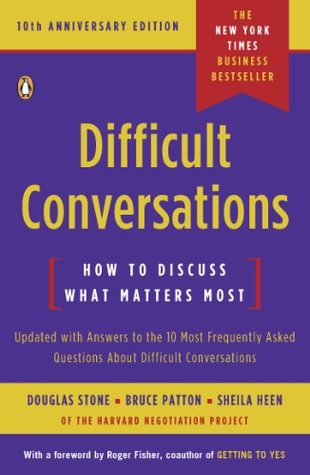More on this book
Community
Kindle Notes & Highlights
Read between
November 27 - December 12, 2022
What makes these situations so hard to face? It’s our fear of the consequences – whether we raise the issue or try to avoid it.
If we try to avoid the problem, we’ll feel taken advantage of, our feelings will fester, we’ll wonder why we don’t stick up for ourselves, and we’ll rob the other person of the opportunity to improve things.
But if we confront the problem, things might get even worse. We may be rejected or attacked ; we might hurt the other person in ways we didn’t intend; and the relationship might suffer.
We know that even with the best of intentions, human relationships can corrode or become tangled, and, if we are honest, we also know that we don’t always have the best of intentions.
Achieving perfect results with no risk will not happen. Getting better results in the face of tolerable odds might.
difficult conversations are almost never about getting the facts right. They are about conflicting perceptions, interpretations, and values. They are not about what a contract states, they are about what a contract means.
the quest to determine who is right and who is wrong is a dead end.
What I think about your intentions will affect how I think about you and, ultimately, how our conversation goes.
we assume we know the intentions of others when we don’t. Worse still, when we are unsure about someone’s intentions, we too often decide they are bad.
In a charitable mood, you may think, “Well, everyone has their opinion,” or, “There are two sides to every story.” But most of us don’t really buy that. Deep down, we believe that the problem, put simply, is them.
The thinking goes like this: “You said I meant to hurt you. I have now clarified that I didn’t. So you should now feel fine, and if you don’t, that’s your problem.”
Our anxiety results not just from having to face the other person, but from having to face ourselves.
Clinging to a purely positive identity leaves no place in our self-concept for negative feedback. If I think of myself as a super-competent person who never makes mistakes, then feedback suggesting that I have made a mistake presents a problem. The only way to keep my identity intact is to deny the feedback — to figure out why it’s not really true, why it doesn’t really matter, or why what I did wasn’t actually a mistake.
complexify your self-image. This means moving away from the false choice between “I am perfect” and “I am worthless,”
One reason people are reluctant to admit mistakes is that they fear being seen as weak or incompetent. Yet often, generally competent people who take the possibility of mistakes in stride are seen as confident, secure, and “big enough” not to have to be perfect, whereas those who resist acknowledging even the possibility of a mistake are seen as insecure and lacking confidence. No one is fooled.
Surprisingly often, an “obvious” and self-serving lie turns out to be a person’s actual belief.
First, be careful about rewarding bad behavior. If you give up and hand people what they want simply “to avoid the hassle,” you end up teaching them that behaving badly pays off, and you will soon see more of the same.


